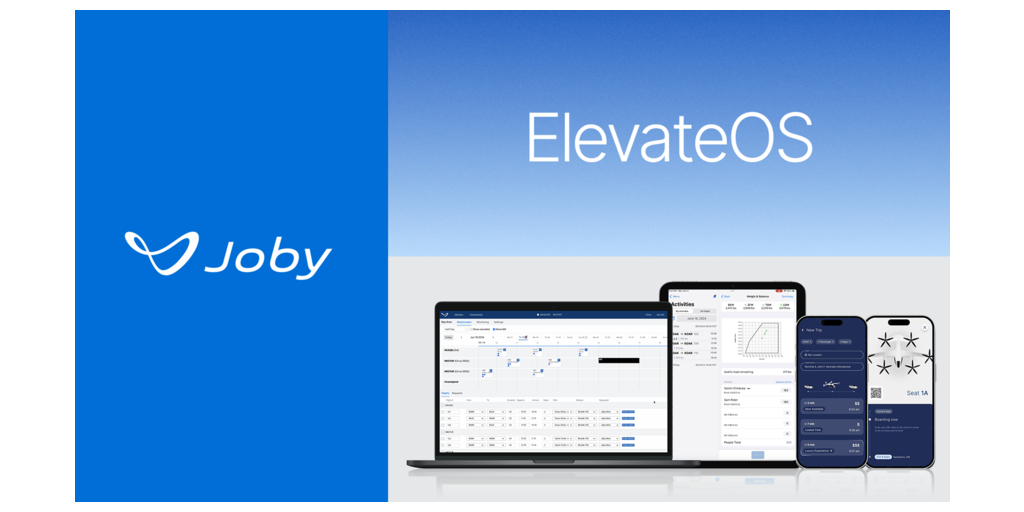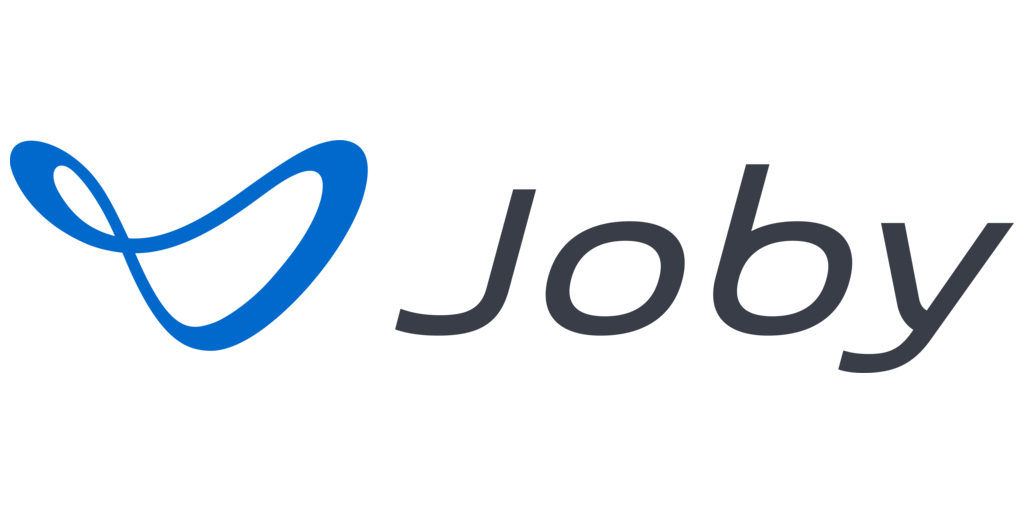Joby Announces ‘ElevateOS’ Software Suite for Air Taxi Operations
- Joby has developed proprietary software to support revolutionary high-tempo, on-demand air taxi operations
- Software suite has undergone real-world testing over the past two years, leveraging Joby’s Part 135 certification
- Joby’s President of Operations, Bonny Simi, and Chief Product Officer, Eric Allison, to present a ‘Pre-Flight Checklist’ for commercial service
SANTA CRUZ, Calif.–(BUSINESS WIRE)–Joby Aviation, Inc. (NYSE:JOBY), a company developing electric air taxis for commercial passenger service, today announced it has received Federal Aviation Administration (“FAA”) authorization to use a suite of software tools developed in-house, called ‘ElevateOS’, that are designed to enable high-tempo, on-demand air taxi operations.
The ElevateOS operating system, which will be introduced during a virtual presentation later today, includes pilot tools, operations and schedule management software, a mobile-first rider app, and an intelligent matching engine. The matching engine is similar to those used by ride-hailing apps today and pairs passengers with available aircraft and landing infrastructure to deliver journeys that are as efficient as possible. Joby plans to use ElevateOS to support its own air taxi operations, as well as making it available to selected partners who purchase the aircraft, as part of a wider services package.
During today’s presentation, Joby will cover a range of other preparations it is making to support the launch of commercial air taxi operations as soon as 2025, including pilot training and the simulation of its planned air taxi service using a conventional aircraft that carries the same number of passengers as Joby’s aircraft. Utilizing a Part 135 Air Carrier Certificate granted by the Federal Aviation Administration more than two years ago, Joby has already been able to use its ElevateOS software to test core aspects of its planned operations, by:
- Offering Joby team members a true, on-demand passenger service, enabling them to book flights with free choice of timing, origin and destination, using the Joby rider app
- Matching passengers with similar routes to each other, using automation tools
- Taking payments from Joby team members and external customers for whole-aircraft chartered flights
- Integrating the use of the Joby pilot app, rider app and back-end operational software
Joby has been actively developing and testing these software tools, in-house, since acquiring Uber Elevate, the air taxi division of Uber in 2021. In 2019, Uber Elevate launched and ran UberCopter, the world’s first on-demand, multi-modal air taxi service in New York City, using traditional helicopters that were bookable via the Uber app.
“The air taxi service we plan to deliver isn’t like any sort of air travel that’s existed before. We expect travelers to book on-demand and to be boarding an aircraft just minutes later, much like the experience of using ground-based ridesharing today. That required us to totally rethink the software and the operations of these aircraft,” said Eric Allison, Chief Product Officer at Joby and former Head of Uber Elevate. “We’ve built ElevateOS from the ground up to enable high-tempo, on-demand flights that will deliver true time savings and seamless mobility to customers.
“ElevateOS is the result of many years of iteration and real-life experience and we’re confident it is the most sophisticated, efficient, and flexible suite of air operations tools available today.”
Today’s presentation will also cover a range of other activities Joby is undertaking to prepare for operations, including:
Training Electric Air Taxi Pilots: Joby has developed an aircraft-specific training course that prepares qualified commercial pilots to fly the Joby aircraft in about six weeks. The course includes the use of immersive flight simulation training devices being developed in partnership with CAE, a global leader in aviation training. Additionally, Joby has already begun offering private pilot training and ground school as part of its future pilot training academy.
Building the Maintenance Workforce of the Future: Joby received its Part 145 Maintenance Certificate earlier this year and is developing a comprehensive maintenance, repair and overhaul (MRO) strategy to ensure maximum aircraft utilization in markets around the globe. Joby received a $1 million grant from the FAA to support the development of maintenance training programs.
Implementing Rigorous Safety Systems: Joby was the first electric air taxi company to have a Safety Management System accepted into the FAA’s Voluntary Program for Air Operations, supporting the Company’s Part 135 operations. It was also the first air taxi company to be awarded the International Standard for Business Aircraft Operations Stage 1 Certification, administered by the International Business Aviation Council, following a safety audit in 2023.
“We are leading the industry in the certification and manufacturing of our electric air taxi as well as in our preparations for commercial service,” said Bonny Simi, President of Operations at Joby. “This is rigorous work that is required for any company to provide efficient and seamless air taxi operations, and many of these items have been years in the making.”
Joby’s electric air taxi is designed to carry a pilot and four passengers at speeds of up to 200 mph, offering high-speed mobility with a fraction of the noise produced by helicopters and zero operating emissions.
Joby intends to operate its aircraft in the U.S. markets including New York City and Los Angeles alongside partner Delta Air Lines, and in the United Arab Emirates, where the Company has a six-year exclusive agreement to provide air taxi services in Dubai. Joby will also partner with local operators in certain overseas geographies, as well as supporting direct sales of its aircraft to business customers such as Mukamalah, the aviation arm of Saudi Aramco, and to potential government partners such as the U.S. Department of Defense.
Today’s presentation will be available via the Upcoming Events section of the Company’s investor website. A replay of the event will be available online for a limited time.
About Joby
Joby Aviation, Inc. (NYSE:JOBY) is a California-based transportation company developing an all-electric, vertical take-off and landing air taxi which it intends to operate as part of a fast, quiet, and convenient service in cities around the world. To learn more, visit www.jobyaviation.com.
Forward Looking Statements
This press release contains “forward-looking statements” within the meaning of the “safe harbor” provisions of the Private Securities Litigation Reform Act of 1995, including but not limited to, statements regarding the development and performance of our aircraft, the growth of our manufacturing capabilities, our regulatory outlook, progress and timing, including our expectation to start commercial air taxi operations as soon as 2025, the expected timing of type certification; our planned operations with the Department of Defense; our business plan, objectives, goals and market opportunity; plans for, and potential benefits of, our strategic partnerships; the markets in which we expect to operate or sell our aircraft; and our current expectations relating to our business, financial condition, results of operations, prospects, capital needs and growth of our operations, including the expected benefits of our vertically-integrated business model. You can identify forward-looking statements by the fact that they do not relate strictly to historical or current facts. These statements may include words such as “anticipate”, “estimate”, “expect”, “project”, “plan”, “intend”, “believe”, “may”, “will”, “should”, “can have”, “likely” and other words and terms of similar meaning in connection with any discussion of the timing or nature of future operating or financial performance or other events. All forward looking statements are subject to risks and uncertainties that may cause actual results to differ materially, including: our ability to launch our air taxi service and the growth of the urban air mobility market generally; our ability to produce aircraft that meet our performance expectations in the volumes and on the timelines that we project; complexities related to obtaining certification and operating in foreign markets; the competitive environment in which we operate; our future capital needs; our ability to adequately protect and enforce our intellectual property rights; our ability to effectively respond to evolving regulations and standards relating to our aircraft; our reliance on third-party suppliers and service partners; uncertainties related to our estimates of the size of the market for our service and future revenue opportunities; and other important factors discussed in the section titled “Risk Factors” in our Annual Report on Form 10-K, filed with the Securities and Exchange Commission (the “SEC”) on February 27, 2024, and in future filings and other reports we file with or furnish to the SEC. Any such forward-looking statements represent management’s estimates and beliefs as of the date of this release. While we may elect to update such forward-looking statements at some point in the future, we disclaim any obligation to do so, even if subsequent events cause our views to change.
Contacts
Investors:
[email protected]
Media:
[email protected]



